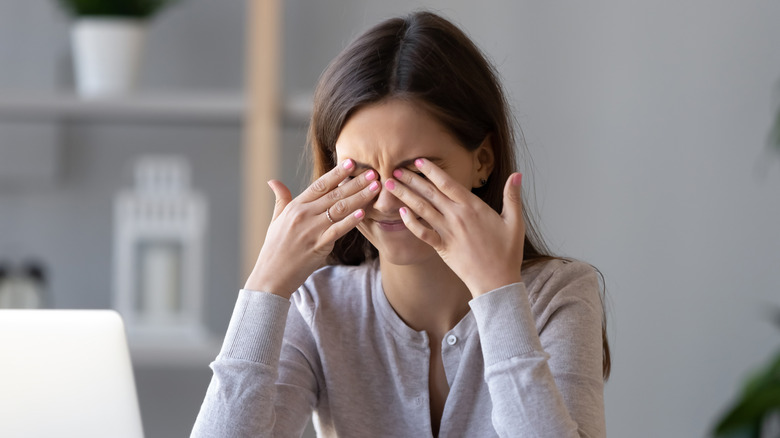What It Really Means When Your Eyes Water
Everyone's eyes water from time to time. There are many reasons this may occur, from allergies to infections to ingrown eyelashes. Most of the time, your eyes produce tears to protect themselves (via KidsHealth). Tears keep your eyeballs moist and wash away foreign materials like dust that can cause irritation. Occasional watery eyes shouldn't be a cause for worry, but frequent watery eyes may point to a health issue that needs to be addressed.
According to WebMD, one common cause of watery eyes is allergies. Millions of people experience allergic reactions to environmental pollutants like pollen, pet dander, and mites. The best way to treat allergies is to remove the allergen from your environment, but it can be difficult to pinpoint what is causing your symptoms. For immediate relief from allergy symptoms like watery eyes, you can try an over-the-counter antihistamine. Eye drops can also help remove irritants from the eyes so they stop watering so much on their own. Severe allergies may need to be treated by prescription-strength medications.
Other potential causes of watery eyes
Allergies aren't the only cause of watery eyes. According to Medical News Today, blocked tear ducts can prevent tears from draining properly. This causes them to build up in the tear sac and can cause watery eyes. Blocked tear ducts can also lead to infections in the eyes. Conjunctivitis, also known as pink eye, frequently causes watery eyes. This health condition is usually accompanied by green or yellow discharge in the eye and a pink color on the whites of the eyes. Other potential causes of watery eyes include an eye injuries, ingrown eyelashes, and dry eyes.
If you frequently have watery eyes, it's best to speak with your doctor. As stated, there are many reasons your eyes might be more watery than normal. Some causes may not be that serious, but others may get worse when left untreated. A doctor can help you get to the root of the problem and figure out the most effective way to fix it.

